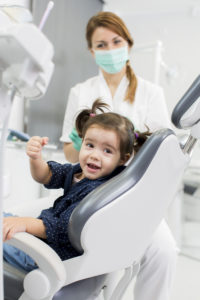For National Children’s Dental Health Month, the American Dental Association and Blue Sky Anesthesia Associates put together a list of questions you should ask your dentist before your child has any type of sedation.
Depending on the treatment, some dentist recommends children be given IV sedation to help them relax, prevent pain and anxiety, for they can safely complete dental treatments.
 Who will provide evaluate my child before the procedure, including their past medical history, such as allergies, current prescription and over-the-counter medications and previous illnesses and hospitalizations?
Who will provide evaluate my child before the procedure, including their past medical history, such as allergies, current prescription and over-the-counter medications and previous illnesses and hospitalizations?
How long should my child go without food or drink prior to the procedure (with the exception of necessary medications taken with a sip of water)?
Will I be giving any sedation medication to my child at home prior to their coming to the office and, if so, what should I be on the lookout for?
For children, the American Dental Association supports the use of the American Academy of Pediatrics/American Academy of Pediatric Dentistry Guidelines for Monitoring and Management of Pediatric Patients During and After Sedation for Diagnostic and Therapeutic Procedures.
What training and experience does the person providing sedation or anesthesia for the procedure have?
Do assisting staff have emergency training? Do they renew their training regularly?
Does the dentist have all the permits or licenses required by the state dental board to provide the planned level of anesthesia or sedation? Not only that, you won’t have to lug all those bags of mulch into your car and then back out when you get home.
Check out these fun activity sheets for children
IV sedation is safe, it can improve the quality of your dental procedure and promote a positive and relaxing experience.
If you think you or someone you love may benefit from sedation dentistry, we recommend you contact our specialist at Blue Sky Anesthesia Associates to discuss your options and to make an appointment. We partner with dentist across New Hampshire, Mane and Vermont, to bring hospital level sedation to your office. Our highest priority is reducing anxiety and ensuring safe dental care.
Check back with us next week for more information and questions to ask your dental provider during and after sedation.


